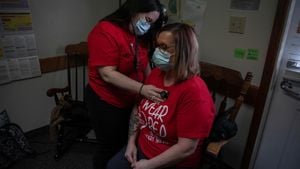A seismic shift is underway within the workflow paradigm, driven by the transformative force of artificial intelligence (AI). Jamie Dimon, the CEO of JPMorgan Chase, believes we might be inching toward not only shorter workweeks but also longer lifespans—possibly even up to 100 years. Speaking on Bloomberg TV, he shared his optimistic vision for the future where technological advancements enable people to work just three and half days each week.
Dimon acknowledges the common fears surrounding AI's potential to disrupt traditional job roles and livelihoods. "Technology has always replaced jobs," he pointed out, emphasizing his belief in AI's ability to improve productivity without sacrificing employment completely. He suggested this advancement could lead to healthier living as well, saying, "Your children are going to live to 100 and not have cancer because of technology, and they’ll probably be working three and half days a week.” Such insights stem from findings and analyses, including one from McKinsey, forecasting the potential for generative AI to automate up to 70% of tasks employees currently undertake.
Considering the mechanical burden of monotonous jobs, AI could transform the workspace fundamentally. Real-world trials suggest shorter working hours might lead to increased morale and productivity. For example, researchers from the University of Cambridge observed improvements from companies adopting four-day workweeks, including reduced sick days by 65% and heightened employee satisfaction—92% of companies retained their shorter schedules post-trial.
But the impact of AI goes beyond the workplace. Dimon believes the future of healthcare could mirror this paradigm shift. With AI poised to catalyze breakthroughs, he noted advancements like drug discovery and predictive analytics might soon enable preventative care, potentially pushing the boundaries on average life expectancies. This connection raises tantalizing possibilities about our health and longevity.
That’s not to say societal concerns are unwarranted. According to Goldman Sachs, AI’s rise could displace up to 300 million jobs globally, posing significant challenges especially to the American workforce. Dimon recognizes these fears but underlines JPMorgan's commitment to mitigating the fallout through proactive measures like job redeployment. He cited the acquisition of First Republic Bank, where 90% of the workforce was retained, showing the company’s dedication to maintaining employee roles, albeit with some transition period for many. “We expect to be able to find them opportunities locally, if we can,” Dimon affirmed.
While Dimon holds firm on the benefits of AI, he doesn’t ignore its darker side. With the rise of cyberattacks and misinformation, AI can be weaponized by malicious entities to cause harm. Dimon voiced this concern, stating, “This one, the biggest negative...is AI being used by bad people to do bad things.” He echoed calls from other tech leaders for comprehensive regulations to safeguard against AI's misuse and to uphold ethical standards.
Economically, the implementation of AI has the potential to drive significant value. A report from McKinsey estimates automation could add between $2.6 trillion and $4.4 trillion annually to the global economy through simplified operations. This leap points to efficiencies across countless industries, balancing costs and boosting productivity.
Historical echoes resonate with Dimon’s predictions. The economist John Maynard Keynes envisioned shorter workweeks as technological advancements took hold, foreseeing a 15-hour workweek. While we haven’t yet achieved this ideal—current averages hover closer to 36 hours—Dimon’s insights hint we may finally be on this path.
To navigate this evolution, he encourages society to be gradually aware of the shifts taking place and prepare accordingly. “People have to take a deep breath,” he remarked, reinforcing the notion of progress requiring acceptance of change.
Rapid advancements continue to shift the way we work and live, as AI’s reach extends beyond typical boundaries. It’s all about adapting to these new realities, maximizing tech benefits, and ensuring everyone can thrive under this changing work environment. Whether we are really moving toward three-and-a-half-day workweeks and living well beyond past expectations remains to be seen. Still, there's no denying—the future looks promising and filled with potential where AI plays the driving role.



